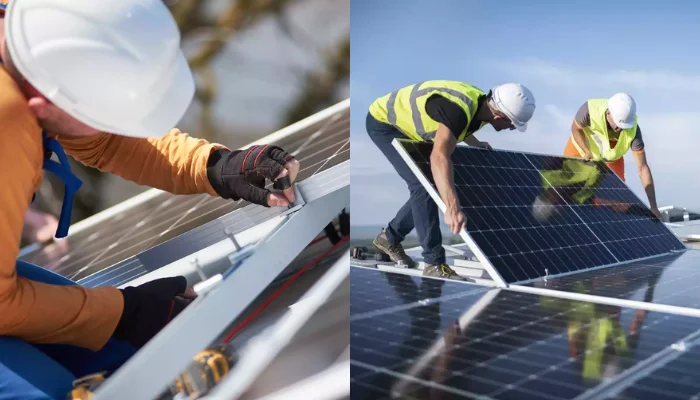How to Start a Solar Business in Pakistan: A Comprehensive Guide
With Pakistan facing a growing energy crisis, the demand for solar energy solutions has significantly increased.
Solar power offers a cost-effective and environmentally friendly alternative to conventional grid electricity, making the solar energy market in Pakistan a highly profitable business opportunity.
The timing couldn’t be better because of supportive government policies, decreasing costs of solar technology, and increased public awareness about renewable energy.
Therefore, we have compiled this blog for you to guide you on how to start a solar business in Pakistan. So let’s start!
Get Registered Your Solar Business Today
From company registration to tax filing, we handle everything so you can focus on growth.

How to Start a Solar Business in Pakistan | 10 Steps
Finally, with the awareness of costs and the basic requirements we have gathered the knowledge required to start the action.
There are simple steps involved in the establishment of a solar business so as to achieve the intended objective.
Now, let’s see how to convert your vision into a prosperous solar energy company in Pakistan.
Step 1: Conduct Market Research
Marketing research is a very important aspect of any business venture. When you are starting, you should collect as much information as possible about your target audience, competitors, and trends in the market.
How to Conduct Market Research?
1. Identify Your Target Market:
- Define who your target ‘market’ is; is it the small business consumer, the residential consumer, or the industries?
- Customers; you have to analyze what energy they require, what they want to buy, and whether they are ready to invest in solar energy systems.
2. Study Competitors:
- Study the local market to get to know about the Solar businesses that it offers and its products and services, its market, and pricing strategies.
- Identify gaps in the market that you can fill.
3. Research Market Trends:
- These require tracking of the current government policies and incentives of the utilization of solar energy.
- Learn about the innovations having to do with solar such as the hybrid and incentives including battery storage.
Step 2: Create a Comprehensive Business Plan

A business plan is your guide on how to run your business and achieve your goals. It reveals what you want to achieve, how you intend to do it and your expected budget.
What to Include in Your Business Plan?
- Business Overview: State your company mission and vision as well as the organizational values.
- Market Analysis: State the results of your market analysis.
- Product and Service Offerings: Designate whether you will be offering installation services, or you will be maintaining them, or even trading them.
- Operational Plan: Explain how you will acquire the necessary materials, how the transportation of products will be done, and the handling of installations.
- Financial Plan: A business plan should also contain startup expenses, expected earnings, and payment methods and resources.
- Marketing Strategy: Explain the ways of targeting and maintaining their customer base.
Step 3: Register Your Business and Meet Licensing and Legal Requirements
To operate legally, your business must comply with Pakistan’s regulations.
Solar Company Registration Process in Pakistan
When registering a company, the Securities and Exchange Commission of Pakistan (SECP) is the primary authority that comes to mind.
On the other hand, the Pakistan Engineering Council (PEC) overseas engineering-related firms, including those involved in solar installations.
PEC grants licenses to companies, firms, sole proprietors, and partnerships, allowing them to undertake engineering projects.
SECP vs. PEC: Understanding the Difference
- SECP handles company registration and legal recognition.
- PEC provides licenses for engineering firms to operate in Pakistan.
PEC Registration for Solar Companies
If a company wants to register for solar installation services, it must apply for a new registration with PEC. Firms can be registered under one of eight categories, ranging from C6 (entry-level) to CA (highest level).
PEC C6 Registration: Entry-Level Category
For new businesses, C6 is the easiest category to register under. If you’re wondering about the requirements, fees, or project limits for C6 registration, check out the detailed guidelines on our blog.
By securing a PEC license, your company can legally offer solar installation services in Pakistan.
Get Your NTN (National Tax Number)
- Register with the Federal Board of Revenue (FBR) to ensure tax compliance.
Obtain Necessary Licenses
- Apply for a license from NEPRA if you plan to operate on a large scale.
- Check local regulations for permits related to installations and equipment sales.
Step 4: Source Solar Panels and Components

Your main products are your solar panels and their components so selecting a reliable supplier is paramount.
How to Source Solar Products?
1. Identify Suppliers:
- Manufacturers can be found by using internet resources such as Alibaba or Made-in-China.com, or by attending a trade show.
- Choose the suppliers you’re planning to work with based on the positive opinions, certifications, and previous results.
2. Negotiate Prices:
- Make calls to several suppliers to know the variations in cost and other delivery charges.
- Ask for better rates quantity and terms of payment.
3. Ensure Quality:
- Ask for samples of the products to be used in trials of how efficient or durable they actually are.
- Check about certifications like ISO or IEC in quality management.
Solar Component Suppliers
| Company Name | Region | Component Types |
| PYTES | China | Storage System, Inverter |
| Chisage ESS | China | Storage System, Inverter, Monitor, Data Logger |
| Sowellsolar | China | Storage System, Inverter, Copper Cable, Aluminium Cable, Connector |
| Angels Solar | China | Mounting System, Roof Attachments, Mounting Rails, Module Clamps, Ground Screws |
| Super Solar | China | Mounting System, Roof Attachments, Mounting Rails, Module Clamps, Ground Screws |
| HQ Mount Tech | China | Mounting System, Roof Attachments, Mounting Rails, Module Clamps, Ground Screws |
| NEP | China | Inverter, PV Fuse, Storage System, Monitor |
| Wanhos Solar | China | Mounting System, Roof Attachments, Mounting Rails, Module Clamps, Ground Screws, Inverter, Storage System, Aluminum Profile |
| 9Sun Solar | China | Storage System, Mounting System, Copper Cable |
| SunArk Power | China | Storage System, Inverter |
| Deye ESS | China | Storage System |
| Kseng Solar | China | Mounting System, Tracker, Roof Attachments, Mounting Rails, Module Clamps, Ground Screws, Storage System |
| Anbo New Energy | China | Storage System, Inverter |
| Enerack | China | Mounting System, Roof Attachments, Mounting Rails, Module Clamps, Ground Screws |
| GSL Energy | China | Storage System, Inverter |
| Hopergy | China | Mounting System, Roof Attachments, Mounting Rails, Module Clamps, Ground Screws |
| Huge Energy | China | Mounting System, Tracker, Ground Screws |
| Enershare Technology | China | Storage System |
| FelicityESS | China | Storage System, Inverter |
| Voltsmile | China | Storage System, Inverter |
| PNTECH | China | Combiner Box, Copper Cable, Connector |
| Mentech | China | Storage System, Inverter |
| Grace Solar | China | Mounting System, Tracker, Mounting Rails, Module Clamps, Ground Screws |
| Beny New Energy | Germany | Storage System, Inverter, Charge Controllers |
| Empery Solar | China | Mounting System, Roof Attachments, Mounting Rails, Module Clamps, Ground Screws |
| Inver Energy | China | Inverter |
| S-5! | United States | Roof Attachments, Module Clamps, Ground Screws |
| Veichi Electric | China | Storage System, Inverter |
| ExtenSolar | China | Mounting System, Roof Attachments, Mounting Rails, Ground Screws, Tracker |
| LVTopSun | China | Storage System |
| Atess Power Technology | China | Storage System, Charge Controllers, Inverter, Monitor, Data Logger |
| Ktech Energy | China | Storage System, Charge Controllers, Inverter |
| Guoqiang Singsun | China | Mounting System, Tracker, Mounting Rails, Ground Screws, Module Clamps, Roof Attachments, Solar Tracker Controller |
| SUG | China | Storage System, Charge Controllers, Inverter |
| INVT Solar | China | Inverter, Data Logger |
| Yuma Solar | China | Mounting System, Roof Attachments, Mounting Rails, Module Clamps, Ground Screws |
| Dawnice Battery | China | Storage System, Inverter, Charge Controllers, Combiner Box |
| Champion Power | China | Storage System |
Step 5: Arrange Investment and Financing
There are capital costs that are required when starting the solar business such as the solar equipment, advertisements, and running costs.
Financing Options for Beginners
- Self-Funding: Avoid taking loans as much as possible by using your own money.
- Bank Loans: Go for banks that provide loans in renewable energy projects.
- Government Grants: Verify government-funded and support programs for solar energy companies.
- Partnerships: This one involves two or more investors or companies who work hand in hand in bearing the cost and sharing facilities.
Step 6: Build a Skilled Team
Your team will be the strength of your business since it will be immersed in selling, installing, and providing customer support.
Steps to Build Your Team
1. Hire Salespeople:
- It is recommended to search for communicative, and at least semi-literate candidates with prior knowledge of solar energy systems.
- Teach them how to convince a customer how important it is for him or her to install solar systems or go for solar.
2. Recruit Technical Staff:
- Hire experienced electricians and technicians for installation and regular servicing of products.
- Ensure interns go through practical sessions in handling solar panel systems, inverters, and batteries.
3. Set Up Compensation Structures:
- Offer a combination of base salaries and performance-based incentives.
- Provide perks like training certifications and career growth opportunities.
Step 7: Develop a Marketing and Promotion Strategy

This is always important to create awareness of your product among your target consumers.
Marketing Ideas for Beginners
1. Create an Online Presence:
- Create a business website in which you present your services and prices as well as your contact information.
- Customers like to be associated with what others are using so share customer success stories on Facebook and coupled with promotions on Instagram.
2. SEO and Digital Marketing:
- Make sure that you have localized your website on how and where you can be accessed by those using search engines in search of solar solutions.
- A sample of specific keywords can be “solar panel installation in Pakistan’ which you can advertise using Google AdWords.
3. Community Engagement:
- Organize some seminars and workshops to make people aware about the importance of solar power.
- Education to the masses should be done using schools and Non-governmental organizations all set to launch a sensitization campaign.
Step 8: Focus on Customer Education and Support
Creating awareness about solar energy to your customers enables them to understand and even trust in your services.
How to Educate Customers?
- They should offer free consultations to enable them to assess their energy requirements.
- Moreover, it is necessary to give clear descriptions of cost reductions and environmental impacts.
- There should be adequate use of success stories and testimonials so as to create an impression of credibility.
Step 9: Provide Installation and Maintenance Services
Making yourself a one-stop shop for the execution of your client’s activities will put you in a class of your own and guarantee you full client retention.
Steps to Offer Quality Services
- Site Inspection: Personally go to the customers’ premises to determine the amount of sunlight the site receives and how much placement space is available.
- System Design: Make the solar unique depending on the energy needs of the customer.
- Professional Installation: Employ skilled employees when fixing panels, inverters, and batteries to avoid accidents.
- Post-Installation Support: Extend timely service and repair packages.
Step 10: Scale Your Business
After the foundation is set correctly and comprehensively, the emphasis should be placed on the growth of the business.
How to Scale Effectively?
- Diversify Offerings: Add hybrid solar systems, battery storage, and energy-efficient appliances.
- Enter New Markets: Focus on areas of minimal access to service or engage in close cooperation with industries for great-scale projects.
- Leverage Partnerships: Join up with real estate developers and government agencies in order to extend your operations.
Understanding the Solar Energy Market in Pakistan
Before diving into the business, it’s essential to understand the dynamics of the solar energy market in Pakistan.
What is Solar Energy?
Solar power is a type of renewable energy obtained from sunlight. They are utilized with solar panels to produce electricity or heat for domestic, commercial, and business purposes.
Why Solar Energy?
- Growing Demand: Pakistan suffers from chronic energy crises; therefore, consumption of solar energy is feasible.
- Government Incentives: There are tax exemptions as well as subsidies offered for solar energy.
- Cost Efficiency: Solar systems minimize the reliance of the public on the national grid and are cheap on electricity bills.
- Environmental Benefits: Solar energy is environmentally friendly hence has no negative impact on the environment and enhances sustainable development.
Types of Solar Businesses
- Solar Panel Installation Services
- Solar Equipment Trading
- Solar Maintenance and Repair
- Off-grid and Hybrid Solutions
Required Skills and Knowledge
To succeed, you’ll need a combination of technical expertise and business acumen:
- Understanding Solar Technologies: Find out about photovoltaic cells, inverters, and batteries.
- Market Trends: Keep abreast with the new developments in renewable energy.
- Business Skills: Expertise in the use of marketing tools, funds control, and customer relations are mandatory.
Initial Costs and Investment
| Category | Details | Cost Range (PKR) |
| Equipment and Inventory | Includes solar panels (10,000/panel), inverters, batteries (20,000–100,000/unit), and mounting accessories (10,000–30,000). | Starting from 10,000 |
| Office and Storage Space | Office setup (100,000–300,000) and storage rental (20,000–50,000/month). | 120,000 – 350,000+ |
| Licensing & Certifications | Business registration (20,000–50,000) and NEPRA licensing for commercial projects (100,000+). | 120,000+ |
| Marketing | Digital (50,000–200,000) and traditional marketing (50,000–100,000). | 100,000 – 300,000 |
| Staffing & Training | Salaries (25,000–50,000/person) and training programs (50,000–100,000). | Varies |
| Logistics | Vehicle purchase (1,500,000) or rental (50,000/month), with additional costs for fuel and maintenance. | 50,000 – 1,500,000+ |
| Working Capital | Recurring operational expenses for salaries, rent, and utilities (minimum 6 months required). | Based on scale |
Total Estimated Initial Investment
For a small-scale business: PKR 1.5 million to PKR 3 million
For a medium-scale business: PKR 3 million to PKR 7 million
For a large-scale business: PKR 10 million and above
Proper budgeting for these expenses ensures a smoother startup phase and allows you to focus on building a reputable and sustainable solar business.
Need Assistance?
Let Ways Tax simplify your company registration, NTN registration, and licensing. Contact us today for expert support!

Key Challenges in the Solar Business
- High Initial Costs: The cost of phasing in quality solar panels and equipment is significant.
- Lack of Awareness: Some of the customers have no clue regarding the future impact of solar energy in their facility.
- Regulatory Hurdles: Legal compliance and licensing is always a challenge in most industries as they may involve lots of requirements that firms need to meet.
- Competition: As the number of market players rises, the importance of the differentiation of services increases.
How Ways Tax Can Help You
How Ways Tax Can Help
Starting a solar panel-selling business requires managing complex legal and financial documentation. Ways Tax can assist you with:
- SECP Company Registration: Simplifying the process of registering your business with SECP.
- NTN Registration: Ensuring compliance with tax requirements by obtaining your National Tax Number.
- Licensing Assistance: Guiding you through the legal requirements for your solar business.
- Tax Compliance: Helping you manage tax filing and compliance, so you can focus on growing your business.
FAQs
Get Started with Ways Tax Today
Now that you’ve learned how to start a solar business in Pakistan you would know that it is a promising opportunity to tap into the growing demand for sustainable energy solutions.
With the right market research, legal compliance, proper investment, and a skilled team, you can successfully establish and scale a solar business. By offering quality products, services, and education to customers, you can contribute to Pakistan’s renewable energy future while also creating a profitable business.
Don’t hesitate to seek professional assistance from services like Ways Tax to simplify the legal and financial aspects of starting your venture.
We will help you in filing different SECP forms like Form A or Form 28. Moreover, we will help you with the registration of your business and also help you with taxation!

